Intel NUC 11 Pro review: Tiny, feature-packed and effective
Intel’s latest PC crams fast connectivity options inside a tiny case
-
+
Solid everyday power
-
+
Sturdy, tiny case
-
+
Good connectivity options
-
+
Loads of specifications available
-
-
Rival CPUs are far quicker
-
-
No card reader
-
-
Mediocre SSD

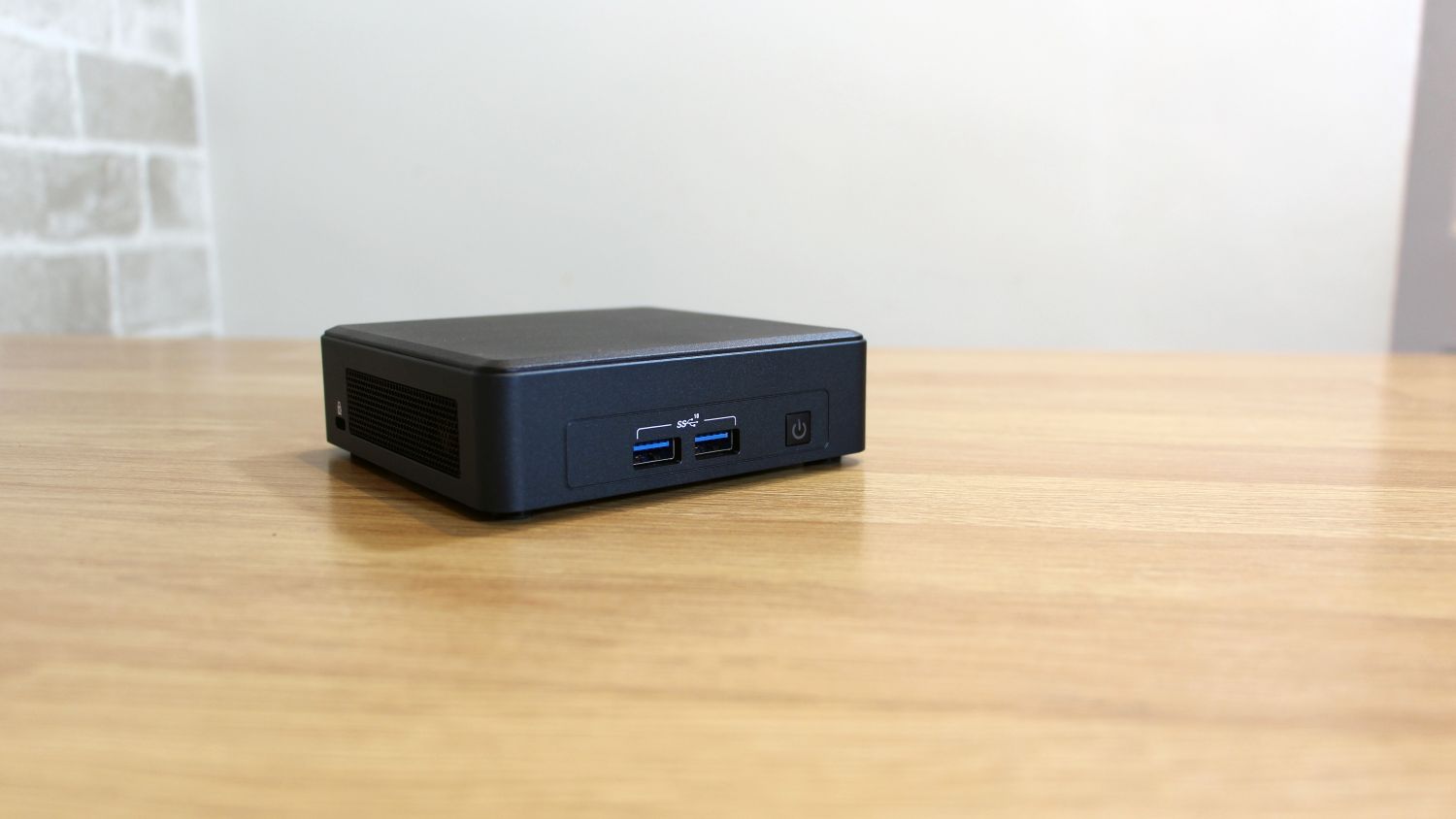
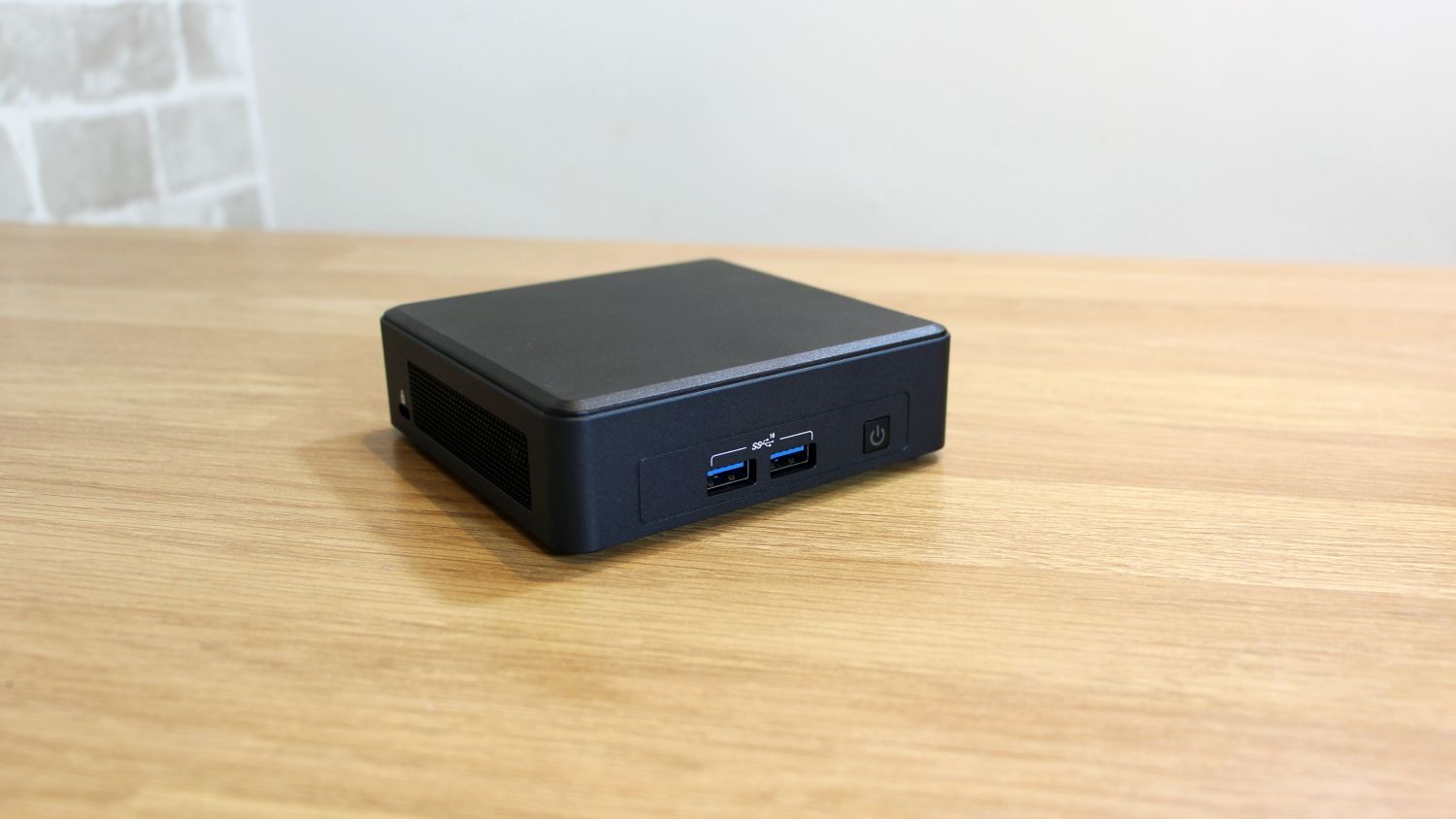
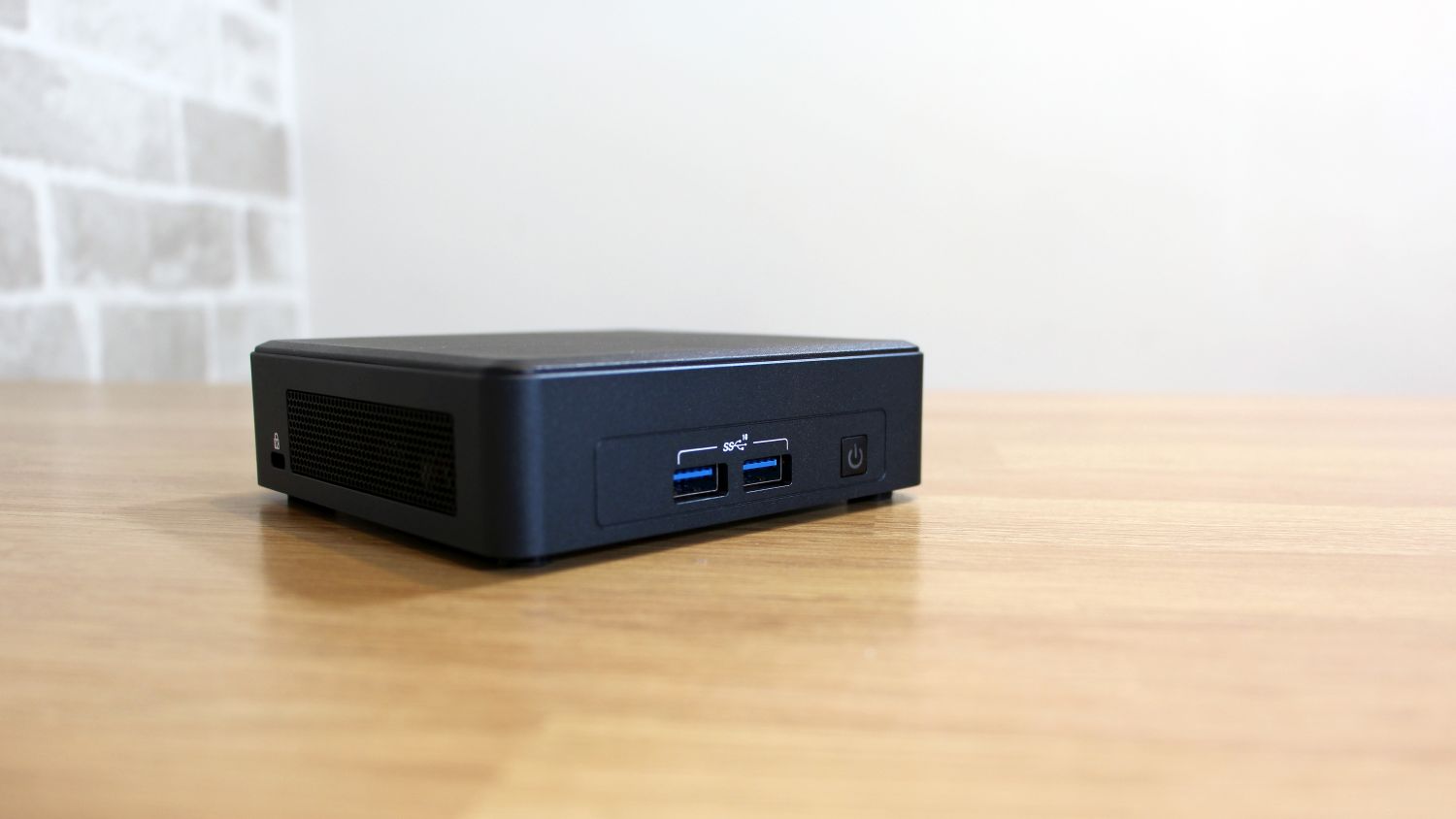
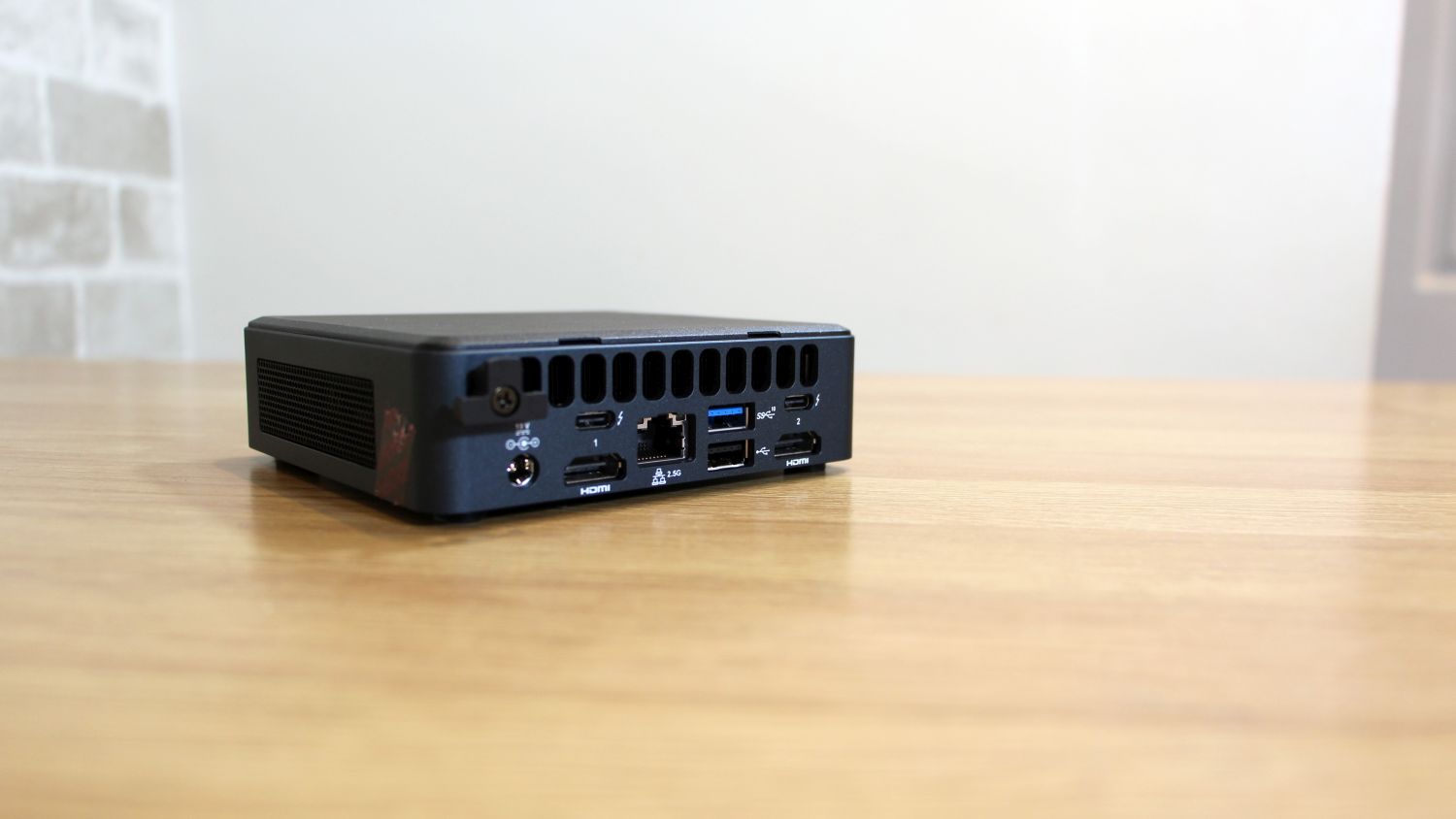
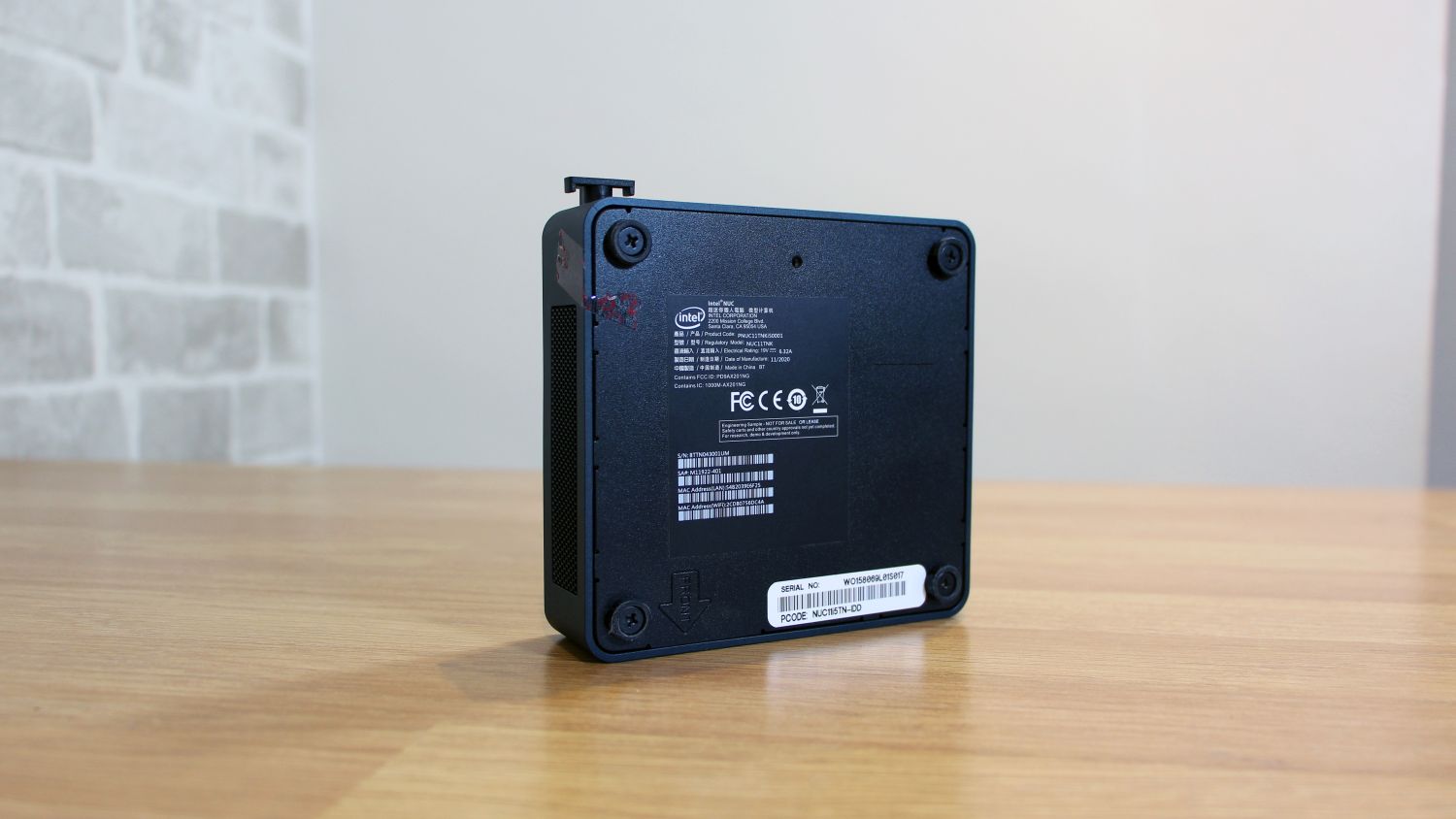
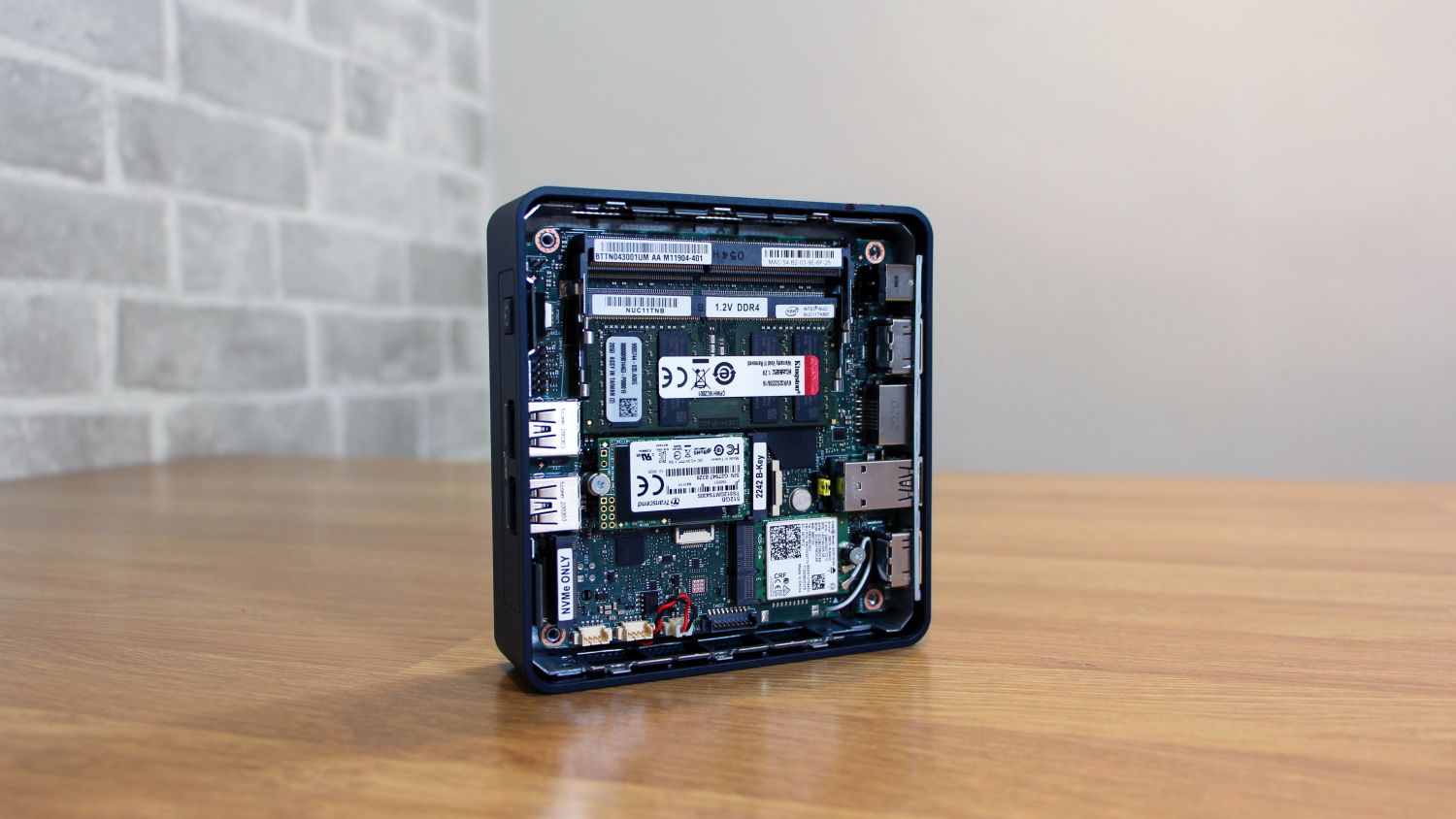
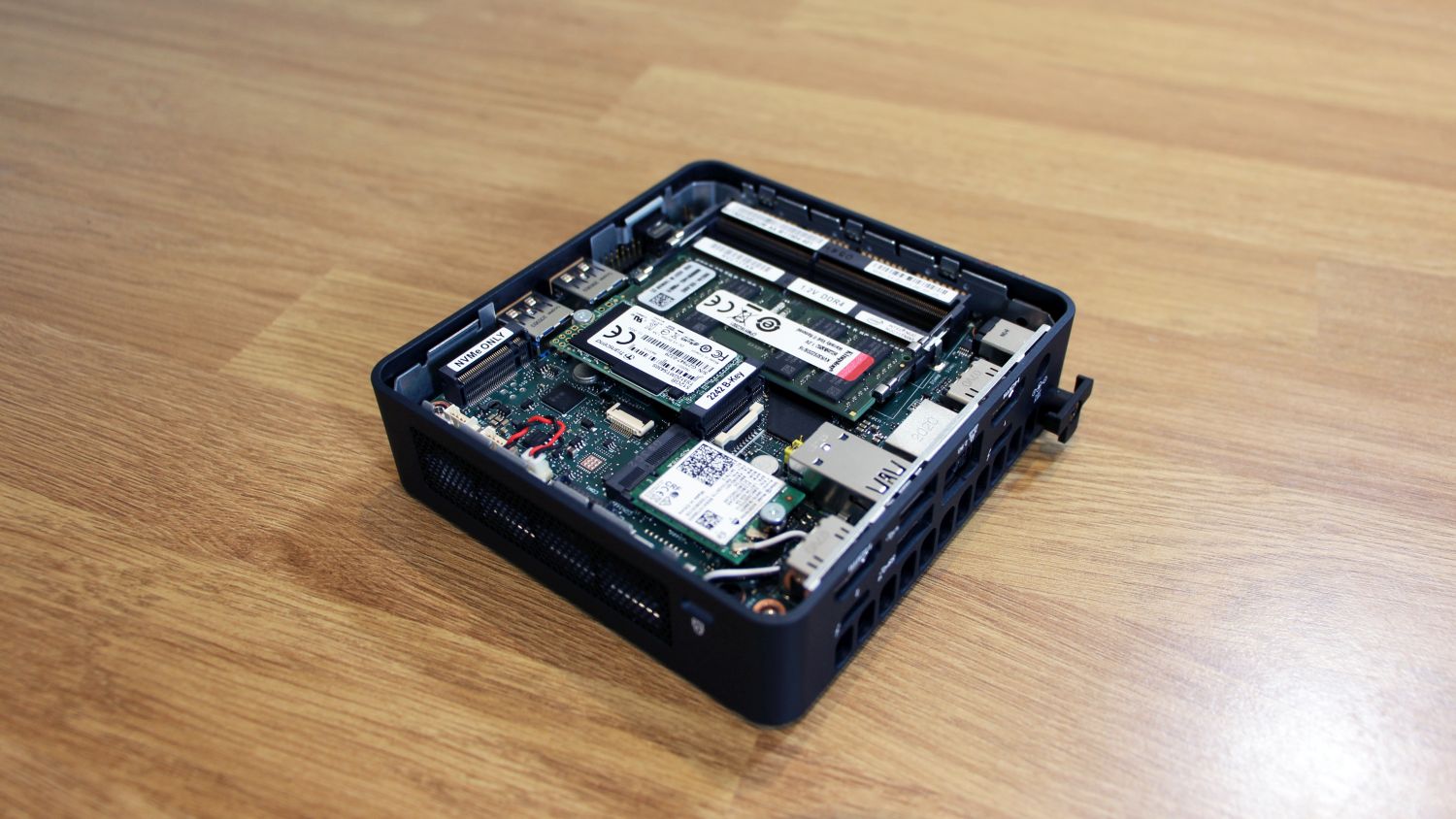
Intel has been building NUC computers for nearly a decade. The NUC acronym stands for Next Unit of Computing, and it’s generally attached to a range of tiny, versatile PCs.
They’re consistently some of the most impressive small form factor PCs on the market, with surprising power crammed into tiny and feature-packed enclosures. The latest models are among the smallest and fastest Intel has ever produced. The Core i5 model reviewed here costs £545 exc VAT, with that figure rising to £672 exc VAT for a Core i7-based version.
Intel NUC 11 Pro review: Design
This latest NUC is tiny: 117mm wide and 112mm deep, just 37mm tall, and with a weight of 504g. It’s so small that it’s easy to lose underneath a couple of sheets of paper, and VESA mount support means it seamlessly attaches to the back of a display.
The sides and lid are made from plastic, with the base and underlying core hewn from metal, and build quality is tremendous throughout. If you need a tiny PC to withstand a busy office, the NUC will be fine.
That underlying base secures with four screws, and the panel is easy to remove. Once inside, the motherboard is straightforward: you’ll find two SO-DIMM memory slots that can accommodate 64GB of memory. The rig has three M.2 slots, with two shorter connectors used for the wireless card and SSD. The third M.2 connector is a full-size 2280 socket that supports PCI-E 4.0, so you’ll be able to install the fastest NVMe SSDs.

The NUC 11 Pro is the smallest machine in the current range. The NUC 11 Performance shares the same width and length as the Pro, but it’s 19mm taller and with different features. The NUC 11 Enthusiast is designed for gaming and content creation and includes Nvidia graphics inside a significantly bigger case.
The only issue with the NUC 11 Pro isn’t the PC – it’s the 120W power supply, which is virtually the same size as the system. While it does provide plenty of juice for extra components and peripherals, it feels a little cumbersome.
Sign up today and you will receive a free copy of our Future Focus 2025 report - the leading guidance on AI, cybersecurity and other IT challenges as per 700+ senior executives
The NUC is one of several superb small form-factor options available now. The latest Apple Mac mini is larger than the NUC but has poorer upgrade options, while the Asus Mini PC PN50 is very accessible and only a little taller than Intel’s unit.
Intel NUC 11 Pro review: Hardware & performance
The NUC 11 Pro we’ve reviewed includes a Core i5-1135G7 processor alongside a 512GB SSD and 8GB of memory in a dual-channel configuration – so, essentially, this desktop PC uses a hardware configuration you’d expect to find in a laptop.
Those components scored 141 in our benchmarks. If your day-to-day life consists of office applications, email clients, and browser-based tools, then the NUC 11 Pro will have no problem getting the job done, and the Core i7 version will handle some light photo editing too.

The NUC is virtually silent when handling low-intensity tasks, and the NUC is no louder than the average work laptop when it tackles more demanding workloads. Speakers, a headset, or a busy office will easily deal with the noise. Internal temperatures were acceptable, although in extended testing the CPU throttled to 3.2GHz. That’s a little slower than the chip’s all-core Turbo peak, but no surprise given the NUC’s size.
The SSD was mediocre, too, thanks to read and write scores of 561MB/sec and 502MB/sec. Those are reasonable results and fine for everyday work, but they’re a long way behind the best NVMe drives and slower than the Mac’s drive.
It’s solid performance, but rivals are far quicker. The M1-powered Mac mini scored 223 in our benchmarks, and the AMD Ryzen 7 4800U inside the Asus returned a score of 213. Both systems are far more adept in more demanding work tasks and content-creation apps. When the Mac mini costs £583 exc VAT and barebone Asus arrives at £408 exc VAT, it makes those alternatives compelling.
Geekbench provides further evidence of Intel’s weaknesses. The NUC scored 1,391 and 4,869 in the single- and multi-core tests. The Mac mini scored 1,740 and 7,694, while the Asus’ AMD chip is a little slower in the single-core test but matches the Mac in the multi-core benchmark.
Intel’s single-core performance is its biggest strength, and that bodes well for everyday workloads and less-demanding tasks. But if you want to run tougher applications, handle multi-tasking or tackle creative work, you’ll want AMD or Apple hardware.

Don’t expect a huge amount from Intel’s Iris Xe graphics, either. It’s got the speed to tackle media playback, basic photo-editing, and casual games, but in the GFXBench Car Chase offscreen test it scored 88fps – while the Mac mini scored 179fps. In 3D Mark Fire Strike, the NUC scored 2,685 points, but the Radeon Vega chip in the Asus is about 1,000 points faster.
Some Core i5 NUC models use the i5-1145G7 processor instead of this rig’s i5-1135G7, but the difference between the two is tiny. The Core i7 version won’t deliver a drastic improvement either, so spending more cash won’t help the NUC surpass its rivals.
The Core i5-based NUC we’ve reviewed costs £545 exc VAT for a complete system with memory, storage, and an OS, which brings it right up against the competition – but there are ways to improve Intel’s value. If you’ve already got memory, storage, and OS licenses then a barebone Core i5 system costs £325 exc VAT, and a barebone Core i7 rig is £435 exc VAT. If you only need a system for entry-level tasks, then a barebone Core i3 model only costs £209 exc VAT.
These machines are all available as fully-specified or barebone rigs and in Pro and Performance guises – the Pro model is smaller and has vPro, and the taller Performance machine has more ports and a 2.5in drive bay. It’s admittedly a confusing range, but for the most part you’ll be able to pick a Core i3, i5 or i7 processor, the Pro or Performance enclosures and either a fully-specced rig or a barebone version. Retailers like Simply NUC also configure systems if you’d like to specify your components and accessories.
Intel NUC 11 Pro review: Ports & features
The NUC may be tiny, but it’s packed with ports. On the front, it’s got two USB 3.2 Gen 2 connectors with a top speed of 10Gb/sec, and the rear has another alongside a USB 2.0 slot. Impressively, the rear also has two Thunderbolt 4 ports, which means a mighty bandwidth level of 40Gb/sec alongside DisplayPort support. Besides these, you’ll find two HDMI sockets and 2.5Gb/sec Ethernet.

Connectivity on the inside extends to dual-band Wi-Fi 6 and Bluetooth 5.1, and the NUC 11 Pro has Intel vPro support and TPM 2.0. Intel also protects this machine with a three-year warranty, which is more generous than the one-year deal provided by Apple and Asus.
Some features are missing, namely audio outputs, an IR receiver, and a card reader. If you need those features and want to stick with a NUC, the Performance model includes those extras alongside more USB connectivity and a lid that charges supported phones and tablets wirelessly using the open source Qi standard.
Nevertheless, Intel has crammed loads into its smallest NUC, and the features compare well to rivals. The Mac mini is close but has slower networking, and the Asus does have a microSD slot, but it’s poorer elsewhere.
Intel NUC 11 Pro review: Verdict
The latest Intel NUC is a welcome addition to the SFF PC market, with a broad range of features that includes lightning-fast Thunderbolt 4 and superb networking. The tiny case is rock-solid, the internals can handle everyday computing, and the vast array of designs improve value and versatility.
As with most Intel products now, though, the processor is the weakest point. Intel’s chips aren’t bad, but AMD and Apple-based rivals are faster in multi-core processing and often no more expensive.
The Intel NUC makes sense if you need the tiniest PC possible, or if its connectivity, warranty, or variety of specifications appeal – but remember that you can find more computing grunt elsewhere.
Intel NUC 11 Pro Specifications
| Processor | 0.9GHz-2.4GHz Intel Core i5-1135G7 |
| RAM | 16GB DDR4 |
| Graphics | Intel Iris Xe |
| Storage | 512GB Transcend TS512GMTS430S SSD |
| Operating System | Windows 10 Home 64-bit |
| Connectivity | Dual-band 802.11ax WiFi, Bluetooth 5.1, 2.5Gbps Ethernet |
| Ports | 3 x USB 3.2 Gen 2, 1 x USB 2.0, 2 x USB 4/Thunderbolt 4/, 2 x HDMI |
| Dimensions | 117 x 112 x 37mm (WxDxH) |
| Weight | 504g |
| Warranty | 3yr RTB |
Mike Jennings has worked as a technology journalist for more than a decade and has been fascinated by computers since childhood, when he spent far too long building terrible websites. He loves desktop PCs, components, laptops and anything to do with the latest hardware.
Mike worked as a staff writer at PC Pro magazine in London for seven years, and during that time wrote for a variety of other tech titles, including Custom PC, Micro Mart and Computer Shopper. Since 2013, he’s been a freelance tech writer, and writes regularly for titles like Wired, TechRadar, Stuff, TechSpot, IT Pro, TrustedReviews and TechAdvisor. He still loves tech and covers everything from the latest business hardware and software to high-end gaming gear, and you’ll find him on plenty of sites writing reviews, features and guides on a vast range of topics.
You can email Mike at mike@mike-jennings.net, or find him on Twitter at @mikejjennings
-
 Trump's AI executive order could leave US in a 'regulatory vacuum'
Trump's AI executive order could leave US in a 'regulatory vacuum'News Citing a "patchwork of 50 different regulatory regimes" and "ideological bias", President Trump wants rules to be set at a federal level
By Emma Woollacott Published
-
 Microsoft Excel is still alive and kicking at 40 – and it's surging in popularity as 82% of finance professionals report ‘emotional attachment’ to the spreadsheet software
Microsoft Excel is still alive and kicking at 40 – and it's surging in popularity as 82% of finance professionals report ‘emotional attachment’ to the spreadsheet softwareNews A recent survey found Gen Z and Millennial finance professionals have a strong “emotional attachment” to Microsoft Excel
By Emma Woollacott Published
-
 LastPass hit with ICO fine after 2022 data breach exposed 1.6 million users – here’s how the incident unfolded
LastPass hit with ICO fine after 2022 data breach exposed 1.6 million users – here’s how the incident unfoldedNews The impact of the LastPass breach was felt by customers as late as December 2024
By Emma Woollacott Published
